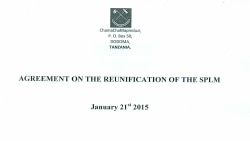South Sudan's SPLM party has moved on from the internal rift that plunged the country into conflict 13 months ago as three factions of the party agreed -- on paper at least -- to set aside their differences and reunify.
Delegates from three factions of the party signed a 12-page agreement in Arusha, Tanzania, laying out key steps toward reunifying the party. Those who signed include the party loyal to President Salva Kiir, another that calls itself the SPLM-in-Opposition and which is led by former vice president Riek Machar, and a third made up of party officials who were detained when the conflict began in December 2013.
A smoldering political rift within the Sudan People's Liberation Movement (SPLM) flared into fighting between supporters of Mr. Kiir and Machar in December 2013.The unrest, which Mr Kiir said was triggered by a failed coup organized by Machar, rapidly spread around the country. Machar fled Juba almost as soon as the fighting erupted, but other SPLM officials were detained on suspicion of being part of the alleged coup plot. They later came to be known as the political detainees. All of them were released within weeks.
The internal quarrels in the SPLM caused the party to splinter into at least three groups. The agreement signed in Arusha on Tuesday acknowledged that the rift in the SPLM was "among the root causes" of the conflict in the country, and that party leaders have "contributed to the emergence of the current crisis."
In the Arusha agreement, the signatories vowed -- once again -- to comply with the provisions of a cessation of hostilities agreement reached nearly a year ago, and to make a "public apology to the people of South Sudan for what has happened since December 15, 2013."
Combating tribalism
They also agreed to "combat the culture of tribalism, militarism and sectarianism" in politics, and to work toward building a South Sudan in which political efforts are focussed on democracy and development.
Akol Paul Kordit, chairman of the SPLM Youth League and spokesman for the government delegation at the Arusha talks, said the next step for the SPLM will be to "... immediately undertake reforms in the party that will lead to reform in the country."
'Not a final peace agreement'
Kordit also said he hopes the agreement will make it easier for the warring sides in South Sudan’s conflict to finally conclude peace talks brokered by the regional Intergovernmental Authority on Development (IGAD) in Ethiopia.
“This is not a final peace agreement but it is an agreement meant to address the root causes of the conflict which started in the SPLM," he said. "This agreement is a watershed in the history of the people of South Sudan. It is a cornerstone in our search for peace. When you solve a problem from its root, you have an opportunity to address all other consequences that came as a result of the root causes.”
The head of the political committee of Machar's SPLM-in-Opposition, Peter Adwok, said he hopes the agreement will accelerate long-running peace talks being led by IGAD.
"What we have signed is a roadmap for really bringing about the reunification of the SPLM. This is going to impact on the IGAD-mediated peace process. It will accelerate the IGAD peace process," he said.
Kordit said the successful outcome of the talks in Arusha was proof that South Sudanese can set aside their differences and work together.
“In Arusha, we were sitting alone. Chama Cha Mapunduzi, the facilitator, which is the ruling party in Tanzania, gave us the opportunity to discuss and come up with solutions to our problem,” Kordit said.
The agreement says SPLM officials who were fired by President Kiir when the crisis erupted will be reinstated in the party. That includes Machar and Pagan Amum, who were deputy chair and secretary general of the party, respectively. Kordit declined to say when sacked officials might be reappointed.
Nhial Deng Nhial, a member of the SPLM'S decision-making body, the political bureau, and the lead negotiator for the government at the IGAD-led peace talks, said it was not certain that everyone who was dismissed from the party will return to the posts they once held.
Kickstart IGAD talks
Daniel Awet Akot, who led the government faction at the talks in Arusha, said the Arusha agreement will help to finally end the conflict that has claimed thousands of lives, crippled the economy, and forced nearly two million people to flee their homes.
But he admitted there are issues that still need to be ironed out, particularly with Machar’s SPLM-in-Opposition group. He did not go into detail about what those issues were but said he hoped they would be resolved at the IGAD-brokered peace talks. Those talks were adjourned last month but are expected to resume soon.
A clause in the agreement urges the SPLM to use the Arusha process together with the IGAD-led talks in Addis Ababa to "expedite the conclusion of the peace agreement in order to end the war."
Alakiir Malual was in a crowd of hundreds that turned up at Juba airport to welcome back Mr. Kiir and his delegation from the Arusha talks. She expressed the hope that the Arusha agreement will signal the beginning of the end of the conflict.
"We, the people of South Sudan, we want peace to prevail and we want development to continue," she said.






